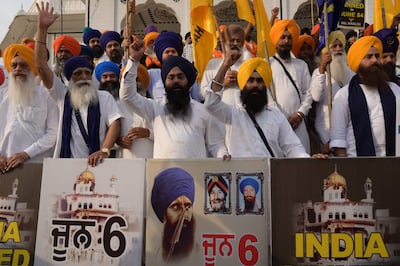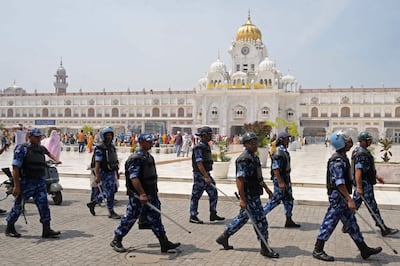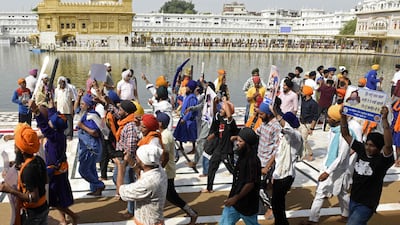Indian authorities increased security around the Golden Temple in Punjab on Tuesday as members of a minority community marked the 39th anniversary of a deadly army operation.
Sikhs who support the creation of a separate state of Khalistan, observe June 6 as a “remembrance day” to mark the 10-day operation by the Indian army.
The operation was carried out to remove separatist leader, Jarnail Singh Bhindranwale, and hundreds of his armed followers, who had taken refuge in the Golden Temple in Amritsar city.
The anniversary follows a revival of separatist calls led by 30-year-old Sikh preacher Amritpal Singh, who was arrested in April.
Mr Singh, who has fashioned himself as “Bhindranwale 2.0”, is the leader of Waris Punjab De, which translates loosely as “Sons of Punjab”, a radical organisation founded by the late actor Deep Sidhu to “protect the rights” of the home state of the Sikh community.
He has gained fame in the last six months, changing from a clean-shaven lorry driver to a bearded preacher wearing traditional Sikh robes and a turban. He often delivers speeches on “genocide” against Sikhs in India in the 1980s and has said that Punjab is facing “slavery” and “colonial rule” by India.
Members of the Sikh outfit, Dal Khala, paraded inside the temple on Tuesday with portraits of Bhindranwale, while chanting pro-Khalistan slogans.
Hundreds of Sikh youths carried Khalistan flags and photographs showing damage inflicted on the Akal Takht – the supreme temporal seat of the Sikhs at Golden Temple – during the army's Operation Blue Star.

The idea of a separate land for Sikhs emerged in the aftermath of British rule in 1947, with the division of Punjab between India and Pakistan.
The partition led to a sense of loss among Sikhs in India, who are culturally and religiously connected with the city of Lahore in the Pakistani area of the state.
Bhindranwale, a Sikh preacher who propagated the idea of creating an autonomous Sikh homeland and eventually became the leader of an armed insurgency, made the Golden Temple his base in 1982.
The army launched Operation Blue Star on June 1, 1984 – at the peak of Sikh insurgency – after Bhindranwale and hundreds of Sikh militants barricaded themselves inside the Golden Temple along with a large cache of arms and ammunition.
The operation lasted 10 days and ended with the death of Bhindranwale and about 500 militants.
The Akal Takht was severely damaged by shelling, causing widespread anger among Sikhs against then prime minister Indira Gandhi, who ordered the army operation.

She was assassinated by her two Sikh bodyguards in October of 1984, triggering anti-Sikh riots in which more than 3,000 Sikhs were killed in the capital alone and an estimated 20,000 across the country.
“1984 has left deep wounds on our hearts and these wounds cannot be healed,” the high priest at Golden Temple, Giani Harpreet Singh, said.
“No ruler tried to heal wounds. Also, it is not wise to expect the government to heal these wounds,” he said.
He called on Sikh groups to work towards strengthening the religion, especially in rural areas, while “expecting the least from the government”.
“Sikhs can never forget the wounds of 1984. Much is being publicised on social media in defamatory terms. I want to clarify that it boosts our strength,” he said.


